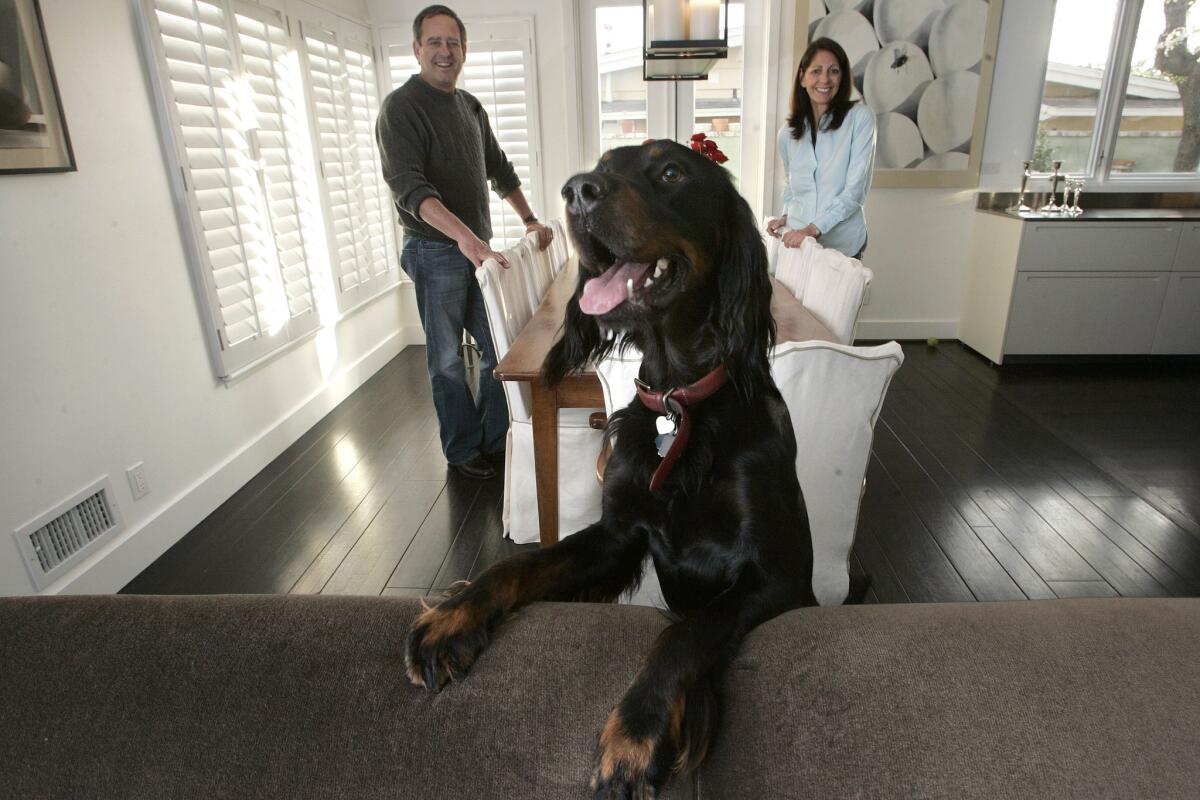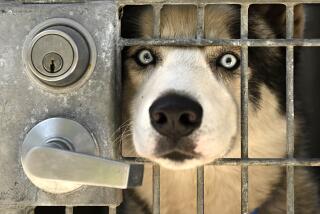Home sellers are advised to remove pets during showings

- Share via
Most people love pets — unless the animals are somebody else’s. Which is why sellers who have critters must take extra precautions. If you don’t, many potential buyers could be chased away.
We’re not talking just about dogs, but also cats, snakes, birds and other creatures. A run-in with any one of them is a definite turnoff, as is their odor. “Pets in the house can be a total deal-breaker for some buyers,” says Darla Jobkar of Northwood Realty Services in Pittsburgh.
“Sellers should take every step possible to maximize the number of showings and then make buyers feel as comfortable as possible while they inspect the property,” agrees Charles Sullivan of Re/Max Metropolitan Realty in Gaithersburg, Md. “When the presence of a pet affects either one of these objectives, the seller may lose money as a result.”
Some people don’t see it that way. They tend to believe that buyers should overlook their animals. Their attitude is such that if you don’t want to buy a house where pets live, go buy something else.
When Elizabeth Weintraub of Lyon Real Estate in Sacramento wrote a blog post sometime back about the pitfalls of selling a house with pets, she was inundated with negative emails from her readers.
The post “struck a raw nerve” with some pet owners, she recalls. “It was their way or the highway when it came to their pets. A few were angry that I would even suggest they remove pets during showings.”
But that’s the first piece of advice for sellers who have pets, and perhaps the most important: Remove them during showings.
Weintraub says that ideally, you should move your animals to another location while your house is on the market. But other agents don’t think you have to go that far. They say removing them during showings is about the best they can hope for.
But even before showings, says Jobkar, the Pittsburgh agent, “the first line of business” is to note in your listing that an animal is on the premises. Also note the pet’s name. Next, place a reminder on the door or near the lock box that a pet is inside. Now visitors are twice-cautioned.
“It’s only fair to warn them before stepping inside a property,” she says. “It’s always up to them if they want to proceed or not, so it’s a shame when sellers don’t take precautions and totally ruin the chance of a sale with a buyer who hasn’t been fully informed beforehand.”
Most people lock their pets in a little-used room during showings or relegate them to the backyard or basement. But that’s not good enough for Kerry Thornhill of Virginia Cook Realtors in Dallas, who suggests putting them in a cage and making sure showing instructions indicate where the cage will be.
“This is the best way for you to ensure the safety of your pet, and to ensure the comfort of your buyers,” Thornhill says.
Beware of putting your pets in unexpected places, even when they are caged. One of Patti Martinez’s clients once pulled back the curtain on a bathtub and found herself staring into a cage with some type of reptile in it. “Scared us both,” the Duluth, Ga., agent recalls.
Better to put the cage against the back wall in whatever room you choose so the visitor will be able to at least enter and look around. Another way to accomplish the same thing is to put the animal in a back room where you know the visitor won’t be spending much time and set up a baby gate at the doorway.
Dogs are sometimes friendly, sometimes not, but always distracting. “The buyer tends to focus on petting the dog or cat, or being afraid rather than focusing on the house,” Susan Metcalf of Avery Hess Realtors in Springfield, Va., says.
That’s why she often walks a client’s dog while the house is being shown. She also acquaints herself with the animal and gives it a treat every time she enters the house so the dog is already familiar with her when the house is being shown.
Barkers are the worst. “There’s no good way to describe the neighborhood or point out the great aspects on the home if you can’t hear yourself think,” says Patty Everitt of Coldwell Banker Collins-Maury in Memphis.
Most of Noreen Parrell’s clients in Briarcliff Manor, N.Y., have small children “who are easily frightened by a barking dog.”
Birds are not usually a problem, as long as they are caged. But if your dog starts yowling, it’s a safe bet your parrot will begin honking too.
If you have fish, keep the tank covered so curious kids won’t be able to put their hands inside. The same holds true for rabbits, snakes and guinea pigs. “The biggest challenge with these animals is to keep buyers from putting their fingers in the cages,” says Karen Mistrot of Karen & Co. Realty in Parker, Colo.
Cats, on the other hand, present their own problems and, Mistrot says, are often more of a turnoff than other animals. “I have had more buyers that dislike the thought of a cat even being in a house than those who don’t like a dog living there,” she says.
Once, when Weintraub, the Sacramento agent, was selling her own house, the buyer’s agent began banging on an upstairs window. “I thought he was showing the buyer the dual-pane windows,” she says. “Turns out my cat had cornered the agent and the buyer and was growling at them.”
Besides removing your pet, it’s also a good idea to remove everything in your house that says animal. The telltale signs are litter boxes, beds, bowls, cat trees and toys. Photos and refrigerator magnets, too. “You don’t need to advertise that pets live there,” Weintraub says.
Once you get rid of those things, get rid of your pet’s odors. Nothing turns people off like a bad smell. And if you don’t think your animals are odorous, think again.
“My biggest gripe is the smell,” says Everitt, the Memphis agent. “Living with pets makes you immune.”
“A bad pet odor will run anyone off,” agrees Parrell in New York.
Adds Jobkar in Pittsburgh: “If someone walks into a house that smells like a dirty kennel, they’re going to think that the smell will never go away. So it’s best to not even let it get to that point.”
Distributed by Universal Uclick for United Feature Syndicate.
More to Read
Sign up for Essential California
The most important California stories and recommendations in your inbox every morning.
You may occasionally receive promotional content from the Los Angeles Times.






